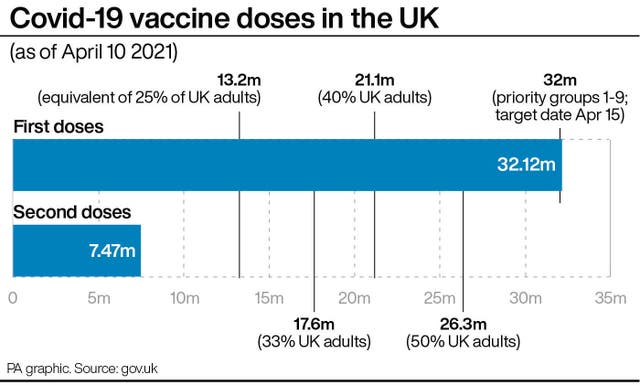Preparations for phase two of vaccine programme under way
But there are supply constraints which could slow the next phase of the programme.

The rollout of the Covid-19 vaccination programme to under 50s in England could begin imminently as the deadline to offer the jab to highest risk group approaches.
Reports suggest that some healthy adults in their 40s could be offered the jab as soon as Tuesday after the Government has met its target for offering the vaccine to over 50s and those deemed clinically vulnerable.
But supply constraints could mean that many may have to wait a little longer to be offered the jab.
In March the NHS in England warned of a “significant reduction in weekly supply” throughout April meaning volumes for first doses will be “significantly constrained”.
It said people “aged 49 years or younger should not be offered vaccination” unless they are in a higher priority group, such as being clinically vulnerable.
It is understood that the guidance still stands.
Throughout April the health service has prioritised second doses of the Pfizer and AstraZeneca vaccines and a record 475,230 people received their second jab on Saturday.
So far almost 40 million vaccinations have been delivered across the UK.
This includes 32 million first doses and almost 7.5 million second doses.
The Government set a target of the middle of April to offer a first dose of vaccine to everybody in the top nine priority groups, also known as phase one of the vaccination programme.
And earlier this month the NHS urged anyone who is eligible for a Covid-19 vaccine to book one immediately and for people to turn up for second doses when called.
In England around 94% of people aged 50 and over in England are likely to have had their first dose of Covid-19 vaccine.
And around 92% of those identified as clinically extremely vulnerable have had their first jab.
Phase two of the programme will see the vaccine offered to younger healthy adults, starting with those aged 40 to 49.
In the UK, regulators have recommended that people aged 18 to 29 should be offered alternatives to the AstraZeneca vaccine, saying there was a possible link between the jab and “extremely rare” blood clots.
This means that they could be offered the Pfizer or Moderna jabs.
The Department of Health and Social care confirmed that doses of the Moderna vaccine will be rolled out in England from “mid April” after first doses were already delivered in Wales and Scotland.
Sir David King, former chief scientific adviser to the Government, praised the efforts so far.

He told Sky News: “The rate of vaccination of over 55-year-olds is over 90%.
“It’s really incredible how the vaccination has been rolled out through the National Health Service.”
Chris Hopson, chief executive of NHS Provider, which represents NHS Trusts, said: “It is an incredible achievement that more than 32 million people have received their first vaccine, with over seven million receiving their second jab.
“While there is still a way to go with our vaccination programme, we welcome the progress being made, with the jabs due to be rolled out to the over 40s this week and all priority groups now offered a first dose.
“We urge everyone to take their Covid-19 vaccine when they are offered it.
“We owe a huge debt of gratitude to NHS staff and volunteers on the frontline, as well as health leaders, undertaking this huge logistical challenge to help protect us from the virus.
“As we return to pub gardens and sports activities and make our way back to non-essential shops, we must continue do all that we can to prevent the spread of infection and ensure this lockdown will be the last.”
A Department of Health and Social Care spokesperson said: “Our vaccination programme continues at pace with over 32 million people having now received a first dose.
“Our target is to offer a jab to over 50s by April 15 and all adults by the end of July, and we are on course to meet that.
“We will be setting out more details later this week.”





